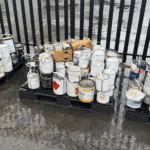The way the treatment of waste electricals is paid for by electrical goods producers is to be revamped, with mandatory collection targets applying to WEEE compliance schemes from January 2014, leading waste services provider Collect and Recycle (http://www.collectandrecycle.com) reports.
The Department for Business, Innovation and Skills (BIS) announced the changes in its response to the consultation on bringing the recast WEEE Directive’s requirements into UK law and to address producer concerns that the true financial burden of electronic recycling was not reflected by current compliance costs.
Draft regulations were published on October 11, with WEEE disposal stakeholders invited to give further comment until November 1. Also set is a target date for the new system to come into force, of January 1 2014.
The proposed new system will make it compulsory for producers to join a producer compliance scheme – with the exception of producers that fall under the de minimis threshold exempting them if they place less than five tonnes onto the market annually.
A tonnage target will be given to each compliance scheme, by category of EEE placed onto the market in proportion to the UK target and the total market share of the scheme’s members during the previous year. Outlawed as part of the new system will be the trading of evidence, which producers blamed for an increase in their overall cost of regulatory compliance.
Schemes that over-collect will be expected to finance the excess or retain the income, while for under-collecting schemes, a ‘compliance fee’ will have to be paid per tonne of WEEE if collection has not been possible – or non-compliance sanctions will be imposed.
Greater freedom will also be given to local authorities to choose WEEE streams that they would like to directly manage and treat, with any revenue or cost for waste handling being absorbed by them.
Business Minister Michael Fallon said that the measures would assist in reducing businesses’ costs.
He stated: “The regulations published today will reduce the cost of compliance for business, bring greater flexibility for local authorities and ensure we meet the requirements of the revised European legislation. The changes to the household WEEE collection system will put us on track to meet the higher collection targets agreed in Europe and drive up the quality of treatment in the UK.”
The government’s consultation, originally launched in April, had outlined four proposed options for the WEEE recycling system’s future. These included not changing and remaining with the present system, as well as introducing a ‘National Producer Compliance Scheme’ as an alternative to current compliance schemes competing with each other.
The third option was to set compliance schemes targets, with a ‘compliance fee’ being imposed if they were not met, instead of WEEE evidence data being traded between collection schemes. The fourth option was for collection sites to be matched to collection schemes.
Here at electrical waste recycling specialists Collect and Recycle (http://www.collectandrecycle.com), we’ll continue to keep you updated on the latest developments relating to all things WEEE.


